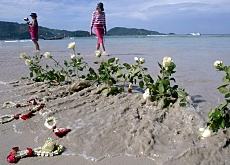Kuoni presents future of travel

By 2020 tourists will be spending their vacations at "hyper holiday hubs" where they will find everything under one roof, including the airport.
To celebrate its centenary, the Kuoni Group, Switzerland’s largest travel company, has commissioned a study on future trends in the travel industry. Not all are positive.
The holiday hubs will be gigantic resorts where European travellers can step off the plane and immediately enjoy the sun as well as sign up for an organic anti-ageing treatment or discount face-lift.
Kuoni commissioned Switzerland’s Gottlieb Duttweiler Institute to conduct the study, “The Future of Leisure Travel”, to show how its European customers will travel in 15 years.
The institute interviewed tourist-sector specialists, travel agents, science-fiction authors and researchers in the futures, market-trends and leisure fields. It also questioned Kuoni travel agents to identify new and unusual customer requests.
The study analyses the wishes and values of travellers, their motivations and even hazards a guess as to the most popular kind of destination in 2020.
Elderly travellers
The authors forecast that in 15 years the industry will be driven by an elderly society in Western Europe with less leisure time as people will most likely be forced to work beyond 65.
A decline of the middle class will lead to a polarisation of the demand for cheap and luxury offers, with tourists expecting even more value for their money than they do today.
Travel will become more complicated amid increasing political uncertainties and terrorist threats.
People will re-consider whether they want to spend a week sunning themselves on a tropical beach as the hole in the ozone layer becomes bigger and they are confronted with health campaigns such as: “Sun? Just say no!”
On the other hand, the industry will benefit from more, faster and cheaper long-distance connections. New search and mapping services will make it possible to mark travellers like parcels and locate them at any time.
Extreme engineering could pave the way for underwater hotels or space trips. Areas threatened by natural disasters will depend more on early-warning, water-treatment and weather-control technology.
The study says that in principle holiday travel will remain a mass business but that it will be less organised as people prefer arrangements booked a la carte to ready-made packages.
Yearning for home
Since people in Europe are more frequently changing their place of work and residence and spending more time with strangers than with their families, the yearning for home will become more important than the desire to see far-away places.
Tomorrow’s travellers will therefore be drawn to the hotel where everything is just like home – only better.
And like home, resorts will be social hubs for meeting and mating, the latter taking on more relevance especially for seniors for whom there is no conventional way of finding a partner.
Health travel will continue to be a growth market but with the emphasis less on the hardware (bathing facilities, saunas etc.) than on emotional and spiritual care.
Elderly Europeans without much disposable income will still be drawn to pensioner colonies in low-wage countries, but with standardised care services.
The study concludes that the ability to implant a travel experience in our brains, as in the film Total Recall, will still not be possible by 2020. That, they say, is still the stuff of dreams.
swissinfo
Short-term trends in the travel industry are well documented but there have been few attempts to make long-term projections for the volatile sector, which is why Kuoni commissioned the future study.
Spending on travel and tourism exceeded $6 trillion (SFr7.8 trillion) globally last year, according to the World Travel & Tourism Council (WTTC).
The WTTC said the industry, through direct and indirect contributions to the world economy, would equal 10.3% of the world’s gross domestic product in 2006. The sector is expected to grow in real terms by 4.6% this year.
The Kuoni Group was founded 100 years ago in Zurich, when Alfred Kuoni opened his first travel agency.
His first tour was a trip to the top of Mount Üetliberg outside Zurich, for which he charged SFr1 per person.
Today, Kuoni has branch offices in 25 countries around the world.

In compliance with the JTI standards
More: SWI swissinfo.ch certified by the Journalism Trust Initiative


You can find an overview of ongoing debates with our journalists here . Please join us!
If you want to start a conversation about a topic raised in this article or want to report factual errors, email us at english@swissinfo.ch.